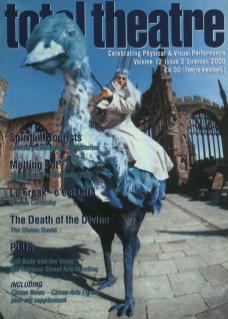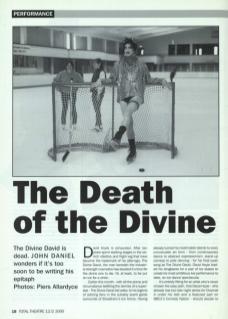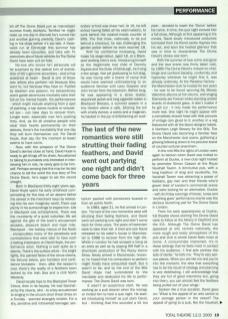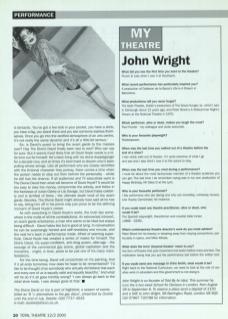David Hoyle is exhausted. After ten years spent stalking stages in the six-inch stilettos and fright wig that have become the trademark of his alter-ego, The Divine David, the man beneath the industrial strength cosmetics has decided it's time for the divine one to die. Or, at least, to be put on ice for a while.
Earlier this month – with all the pomp and circumstance befitting the demise of a superstar – The Divine David bid adieu to his legions of adoring fans in the suitably avant garde surrounds of Streatham's Ice Arena. Having already turned his inestimable talents to every conceivable artform – from contemporary dance to abstract expressionism, stand-up comedy to pole dancing – for his final swan song as The Divine David, David Hoyle traded his slingbacks for a pair of ice skates to create his most ambitious live performance to date, an ice dance spectacular.
It's entirely fitting for an artist who's never chosen the easy path, that David Hoyle – who already has two late-night series for Channel 4 under his belt and a featured part on BBC2's Comedy Nation – should decide to kill off The Divine David just as mainstream success finally beckons. Terrified he might wake up one day to discover he's turned into just another gurning celebrity, David's cashing in his chips before it's too late. A three-week run at Edinburgh this summer has already been cancelled, and talks with TV executives about future vehicles for The Divine David have been put on hold.
No-one who knows him personally will be surprised by this radical turn of events. One of life's genuine eccentrics – and a true anarchist at heart – David is one of those rare artists who perform not because they want to, but because they have to. Fuelled by idealism and passion, his extraordinary avant garde adventures inevitably take their toll on his mental health. His performances – which might include anything from a spot of painting, a tap dance routine or simulated sex – can take days to recover from. Longer even, especially now he's pushing forty. And, as for all creative people who wear their hearts permanently on their sleeves, there's the inevitability that one day they will burn themselves out. For David Hoyle, that day (for the moment at least) seems to have come.
Now, with the prospect of The Divine David's demise close at hand, David Hoyle is ready to get things off his chest. Accustomed to talking to journalists only interested in interviewing him in role, he rarely gets to be himself. Perhaps sensing that this may be his last chance to tell the world the true story of The Divine David, he's eager to set the record straight.
Born in Blackpool thirty-eight years ago, David Hoyle spent his early childhood compensating for the loss of an absent father (he served in the merchant navy) by retreating into his own imaginary world. There was plenty in his surroundings to inspire him. Life in Blackpool was schizophrenic. There was the mundanity of a quiet suburban life set against the glitz of the town's amusement arcades, pleasure beach and royal mile. Blackpool – the holiday mecca of the North – encapsulates many of the paradoxes and contradictions that were later to have such a lasting impression on David Hoyle, the performance artist. Nothing is ever quite as it seems. There's the surface allure – the bright lights, the painted faces of the circus clowns, the fortune tellers, pan handlers and confidence tricksters – then, after the season's over, there's the reality of a Northern town lashed by the Irish Sea and a chill North Westerly.
David recalls trips to the Blackpool Tower Circus, then in its heyday. He was fascinated by the clowns, who – to a boy accustomed to singing in the church choir three times on a Sunday – seemed strangely sinister. For a shy, sensitive and introverted teenager, secondary school was sheer hell. At 16, he left school having failed all his examinations, to work behind the cooked-meats counter at BHS. The first male, nationally, to be put behind a checkout, he was challenging the gender police before he even reached 18.
With his confidence increasing, David made his stage debut, aged 18, at a Blackpool working men's club. Introducing himself as the illegitimate love child of Dorothy Squires and the Duke of Edinburgh, he'd sing a few songs. Not yet graduating to full drag, he was toying with a brand of camp that would have seemed unthreatening to an audience familiar with Larry Grayson and John Inman from the television. Before long, he was appearing in a straw boater, sequinned jacket and long cigarette holder in Blackpool Breezes, a summer season in a tiny theatre above a cafe. Sharing the bill with a belly dancer, a comic and a magician, he basked in the joy of entertaining an auditorium packed with pensioners bussed in from all points North.
In 1983, aged 21, he first arrived in London. The last of the new romantics were still strutting their fading feathers, and David went out partying one night and didn't come back for three years. The years of hedonism were to take their toll. A tired and sick David retreated to his sister's house in Manchester in 1986 to recover from the high life. Whilst in London he had scraped a living as an extra as well as by playing Riff Raff in a shambolic production of The Rocky Horror Show. Newly arrived in Manchester, however, he hoped that his compulsion to perform might finally have exhausted itself. But it wasn't to be, and by the end of the 80s David Hoyle had surrendered to the inevitable and dedicated his life to performance. The Divine David was born.
The last of the new romantics were still strutting their fading feathers, and David went out partying one night and didn't come back for three years
It wasn't an auspicious start. He was working as a pub cleaner when the manager invited him to host a quiz night. He started introducing himself as just plain David, but – thinking that this sounded a bit too plain – decided to insert the 'Divine’ before his name. In time, the quiz night evolved into a full show. Although at first appearing in his civvies, David slowly introduced costumes borrowed from his friend Jackie Haynes into his act, and soon the twisted glamour that was in time to characterise The Divine David's shows was born.
With the summer of love come and gone and the rave scene now firmly taken root, by 1990 The Divine David's mission to challenge and confront banality, conformity and hypocrisy wherever he might find it, was already underway. At the Paradise Factory – the Manchester club he hosted for two years – he was to be found spinning My Bloody Valentine albums at full volume, and singing Diamonds are Forever whilst standing amidst shards of shattered glass. It didn't matter if he got cut – it only made the performance more real. One night he might appear with a completely shaved head with little pictures of vintage cars glued to it; another, in a wig festooned with all the latest designer labels. A Northern Leigh Bowery for the 90s, The Divine David was becoming a familiar face on the Manchester club scene, gathering a growing following drawn to his peculiar brand of countercultural anarchism.
In the mid-90s the lights of London were again to beckon when David was invited to perform at Duckie, a new club night hosted by promoter Simon Casson at the Royal Vauxhall Tavern. A diminutive pub, with a long tradition of drag and vaudeville, the Vauxhall Tavern was attracting a posse of lesbians, gay men and their friends who'd grown tired of London's commercial scene and were looking for an alternative. Duckie – with its Friday evenings of booze, tunes and 'anything goes' performance events – was the obvious launching pad for The Divine David in London.
From his early appearances at Duckie, full theatre shows starring The Divine David were to follow at the Albany in Deptford and the ICA. Although The Divine David has appeared at arts centres nationally, the more rough and ready atmosphere of the pub and club is where David feels most at home. A consummate improviser, it's in these settings that he feels most in contact with his audience. 'I find arts centres this side of sterile,' he tells me. ‘They're very serious places. When you are like me and you're into the moment, the idea that everything has to be the result of strategy and planning is very debilitating. I will acknowledge that they are full of good intentions but, going into them, you can almost feel the feathers being pulled out of your wings.’
Spoken like a true socialist. David goes on: 'What is the appeal of an arts centre to your average person in the street? The appeal of going to a pub, like the Vauxhall, is fantastic. You've got a few bob in your pocket, you have a drink, you have a fag, you stand there and you see someone express themselves. Once you go into the rarefied atmosphere of an arts centre, it's not really the same dynamic and it's all a little bit serious.'
So, is David's quest to bring the avant garde to the masses over? Has The Divine David finally been laid to rest? Who can say for sure. But it seems most likely that all David Hoyle needs is a little time out for himself. He's been living with his divine doppelganger for a decade now, and at times it's been hard to discern who's been pulling whose strings. Like all performers who are closely identified with the fictional character they portray, there comes a time when the person needs to step out from behind the personality – whilst he still has the chance. If all audiences and TV executives want is The Divine David then what will become of David Hoyle? It would be too easy to take the money, compromise the artistry, and follow in the footsteps of Julian Clarey or Lily Savage, but David hates celebrity and is terrified of fame – the ultimate death knell of the avant garde. Besides, The Divine David might already have said all he has to say, killing him off in his prime may just prove to be the defining moment of David Hoyle's career.
As with everything in David Hoyle's world, the truth lies somewhere in the midst of all the contradictions. An extroverted introvert, an avant garde entertainer, a man who wants to be liked but enjoys being difficult – David hates lies but is good at lying. In conversation he can be surprisingly honest and self-revelatory one minute, and the next he's back in performance mode. Afraid of seeming superficial, David Hoyle has created a series of masks for himself. The Divine David, his super-confident, anti-drag queen, alter-ego – the scourge of the commercial gay scene, global capitalism and the monarchy – might, in time, prove to be just one of his many manifestations.
For the time being, David will concentrate on his painting. And if it all ends tomorrow, how does he hope to be remembered? I’d like to be thought of as somebody who actually did believe that each and every one of us is equally valid and equally beautiful.' And what will he do if it all goes horribly wrong? 'I can always go back to the retail shoe trade. I was always good at that.'
The Divine David on Ice is part of Nightbird, a season of events billed as '8 1/2, alternatives to the gay disco', presented by Duckie until the end of July.



